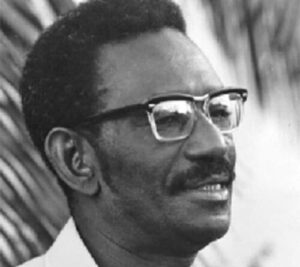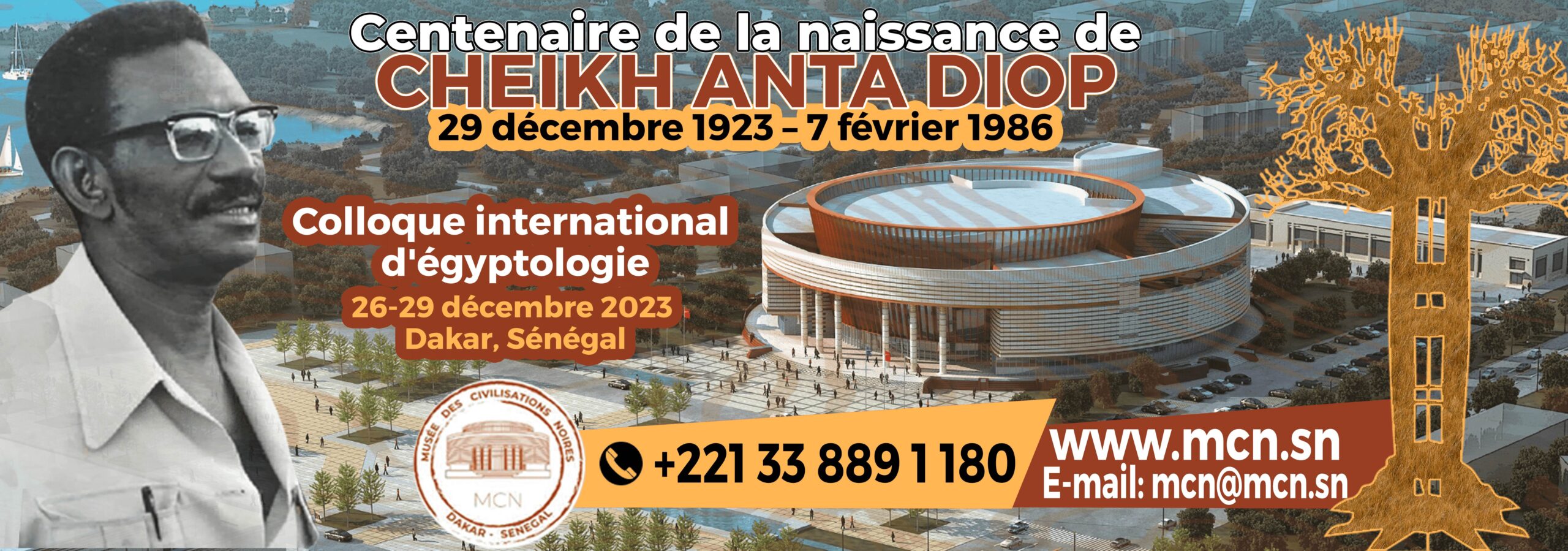Cheikh Anta Diop’s short biography

Cheikh Anta Diop was born on December 29, 1923 in the village of Caytou located in the Diourbel region of Senegal, approximately 150 km from Dakar. After Koranic, primary and secondary studies in Senegal, Cheikh Anta Diop received dual higher education in human sciences and exact sciences in Paris, France. He published in 1954, with Éditions Présence Africaine founded by Alioune Diop, a resounding work, Negro Nations and Culture – From Egyptian Negro Antiquity to the Cultural Problems of Black Africa today which founds African humanities on a basis scientific and of which Aimé Césaire wrote: “… Negro Nations and Culture — the most daring [book] that a Negro has so far written and which will undoubtedly count in the awakening of Africa” (Discourse on the Colonialism, 1955).
In January 1960, he defended his state thesis at the Sorbonne in the field of historical sociology, which will appear in two books by Éditions Présence Africaine: Precolonial Black Africa and The Cultural Unity of Black Africa. With these first three works, Cheikh Anta Diop founded the scientific history of the African continent at the same time as he inaugurated an African historical school. He returns to Senegal permanently. He was assigned to the IFAN (French Institute of Black Africa which later became the Fundamental Institute of Black Africa), then directed by Théodore Monod. Cheikh Anta Diop devoted himself partly to archaeology, then undertook to create a Carbon 14 (radiocarbon) dating laboratory within IFAN. By a Service Note dated April 17, 1963, Théodore Monod formalized, within the Department of Archeology and Prehistory of IFAN, the existence of the “Radiocarbon Dating Laboratory” headed by Cheikh Anta Diop. . In 1966 the laboratory became fully operational with the delivery, thanks to the French Atomic Energy Commission (CEA) of the Saclay Nuclear Studies Center in France, of the Intertechnique company’s transistorized radioactivity counting unit, “RA14”. Working relations have been established between IFAN and the CEA/CNRS (French National Center for Scientific Research) with in particular Jean Le Run, Jacques Labeyrie, Director of the Center for Low Radioactivities (CFR) and Georgette Delibrias, Director of the Laboratory of Radiocarbon from the CFR of Gif-sur-Yvette. Cheikh Anta Diop gives the name of Théodore Monod to the date measurement room and the name of Jean Le Run to that of the chemical treatment of the samples, as a token of recognition to the eminent scientific personality who created and directed IFAN ( until 1965) and to one of the pioneers of “Carbone 14” in France with whom he had trained at “C14”. With the exception of that of Southern Rhodesia (today Zimbabwe), it is, then, the only Carbon 14 laboratory existing in black Africa. The foundations of the laboratory were designed to support an additional floor because Cheikh Anta Diop had envisaged from the start of the project to develop and expand the activities of this laboratory which he considered to be the nucleus, south of the Sahara, of a future major African center of low radioactivity, which will eventually bring together different dating methods. Many fields can benefit from the existence of such a laboratory: archaeology, prehistory, history, geology, climatology, etc. The results of the dating of archaeological samples are published in the IFAN Bulletin and in the international journal Radiocarbon. In 1968, Cheikh Anta Diop published the work: The IFAN radiocarbon laboratory which is a description of the installations and brings together the stability measurements of the meters carried out from December 20, 1966 to May 30, 1967. It also contains the results of the first dates obtained from three samples provided respectively by Théodore Monod, the dating laboratory of Saclay/Gif-sur-Yvette and a British archaeological mission in Gambia. A few years later, in 1974, he published a work, Nuclear Physics and Absolute Chronology, which describes the various methods of dating archaeological and geological samples, in particular those of radiocarbon, implemented in the Dakar laboratory. It was within the framework of the writing of the General History of Africa that, on his initiative, an international conference was held in Cairo from January 28 to February 3, 1974 on The settlement of ancient Egypt and on the decipherment of Meroitic writing, which brought together some of the most eminent Egyptologists from around the world (see report published by UNESCO and in volume II of the General History of Africa. In September 1976, he participated in the 9th congress of the International Union of Prehistoric and Protohistoric Sciences (UISPP) which was held in Nice, at the end of which he was elected member of the UISPP Bureau. Cheikh Anta Diop also continues the research he had previously undertaken in various fields: prehistory (the origin of man and his migrations), Egyptology, African historical linguistics, the evolution of societies, the contribution from Africa to civilization. Within the framework of UNESCO, with other eminent African historians such as Sékéné Mody Cissoko, Joseph. E. Inikori, Joseph Ki-Zerbo, Gamal Mokhtar, Djibril Tamsir Niane, Théophile Obenga, Iba Der Thiam, etc., he contributed decisively to the writing of the General History of Africa. He is often asked to take part in conferences and congresses, to give conferences, in Africa, Europe and the Americas. Cheikh Anta Diop is a signatory of the Athens Appeal against racism and racial discrimination, launched in 1981 under the aegis of UNESCO by intellectuals from around the world, including the geneticist Albert Jacquard. He fights tirelessly for the promotion of scientific research in Africa. He received, with the African-American academic and founding member of the National Association for the Advancement of Colored People (NAACP), William Edward Burghardt Du Bois, the prize of the 1st Festival of Negro Arts of 1966 rewarding the writer who exerted the greatest influence on Negro thought of the 20th century. All his life he led a political fight for the liberation of Africa, its rebirth, its development, democracy, and the construction of a continental federal state capable of meeting the demands of the modern world. Cheikh Anta Diop died on February 7, 1986 in Dakar-Fann; he rests in Caytou, near his grandfather Massamba Sassoum Diop. His wife, of French origin, Louise Marie Diop-Maes, died on March 4, 2016, is buried in Caytou. A history and geography teacher, she had a doctorate in human geography from the University of Paris-1/Panthéon-Sorbonne; she published her thesis under the title Black Africa – Demography, soil and history. This is innovative multidisciplinary research work that overturns the usually presented vision of the long-term demographic history of sub-Saharan Africa.
